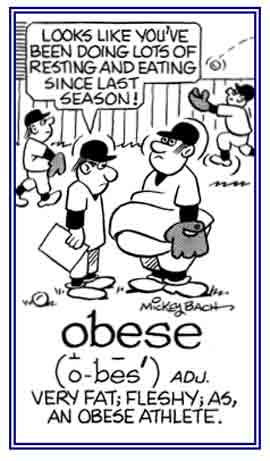obeso-, obes- +
(Latin: fat, corpulent)
2. Etymology: from Latin ob-, "completely" + edere, "to eat".


Go to this Word A Day Revisited Index
so you can see more of Mickey Bach's cartoons.
Obesity is a term used to describe body weight that is much greater than what is considered healthy.
Obesity increases the possibility of various diseases, especially heart disease, type 2 diabetes, obstructive sleep apnea, certain types of cancer, and osteoarthritis. or joint disease.
The term obesity is usually not employed unless the individual is from 20% to 30% over average weight for his or her age, sex, and height.
Nearly two-thirds of the United States population is thought to be overweight and obesity can cause medical complications that may lead to hospitalization for type 2 diabetes, sleep apnea, and asthma.
Participation in physical activity can help children and adults manage their obesity, control blood pressure, and maintain healthy bones, muscles, and joints.

Go to this Word A Day Revisited Index
so you can see more of Mickey Bach's cartoons.
2. A chemical that leads to overweight by increasing the production and storage capacity of fat cells: Obesogens, a series of chemicals known as endocrine disruptors, imitate hormones and confuse the body and cause fat storage.
Many obesogens penetrate through the plastic containers into food and beverages, like plastic bottled water, or into canned foods. Agricultural chemicals sprayed on crops, or foam cushions, or plastics used to store food or water can all contain obesogens.
Jack, troubled with pocrescophobia, was always sure he had a very slim figure by not eating any cake or ice cream, and went to the fitness studio many times during the week.
